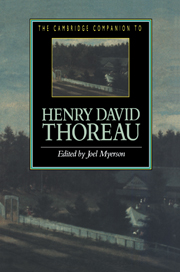Book contents
- Frontmatter
- 1 Thoreau’s reputation
- 2 Thoreau and Concord
- 3 Thoreau and Emerson
- 4 A Week on the Concord and Merrimack Rivers
- 5 Thoreau as poet
- 6 Thoreau and his audience
- 7 Walden
- 8 Thoreau in his Journal
- 9 The Maine Woods
- 10 A wild, rank place
- 11 Thoreau’s later natural history writings
- 12 Thoreau and the natural environment
- 13 Thoreau and reform
- Further reading
- Index
- Series List
5 - Thoreau as poet
Published online by Cambridge University Press: 28 May 2006
- Frontmatter
- 1 Thoreau’s reputation
- 2 Thoreau and Concord
- 3 Thoreau and Emerson
- 4 A Week on the Concord and Merrimack Rivers
- 5 Thoreau as poet
- 6 Thoreau and his audience
- 7 Walden
- 8 Thoreau in his Journal
- 9 The Maine Woods
- 10 A wild, rank place
- 11 Thoreau’s later natural history writings
- 12 Thoreau and the natural environment
- 13 Thoreau and reform
- Further reading
- Index
- Series List
Summary
In the Transcendentalist view, especially as articulated by Ralph Waldo Emerson in “The Poet ” and in Nature, the poet’s responsibility is essentially religious - by a finer organization, a greater sensitivity to truth and beauty, the poet perceives and interprets the eternal realm that stands behind the apparent reality of the material world. Thoreau aspired to this sacred and powerful vocation at least from the time he began keeping his Journal in October 1837. Emerson indicates that poetry is defined by the strength of its internal source rather than by the regularity of its external form,' but as a young man just beginning to explore the shape of his literary vocation, Thoreau, with Emerson’s encouragement, was a dedicated writer of verse.
Thoreau’s poetry is for the most part unremarkable in its subject and its form, and it suffers in comparison with even the quotidian prose of the Journal. In the poems, Thoreau often uses images provided by natural phenomena in and around Concord, and he applies the high standards of his idealism to aspects of the human condition - love, friendship, memory, the transitory nature of life. Nature is acknowledged as the source of inspiration, and provides analogies and tropes for Thoreau’s perceptions and concepts. More than three quarters of the poems are written in the first person or foreground the speaker in some way. Despite this, in general they are quite bland. In many cases, the persona provokes only mild interest, and the situations lack drama.
- Type
- Chapter
- Information
- The Cambridge Companion to Henry David Thoreau , pp. 57 - 70Publisher: Cambridge University PressPrint publication year: 1995
- 2
- Cited by

